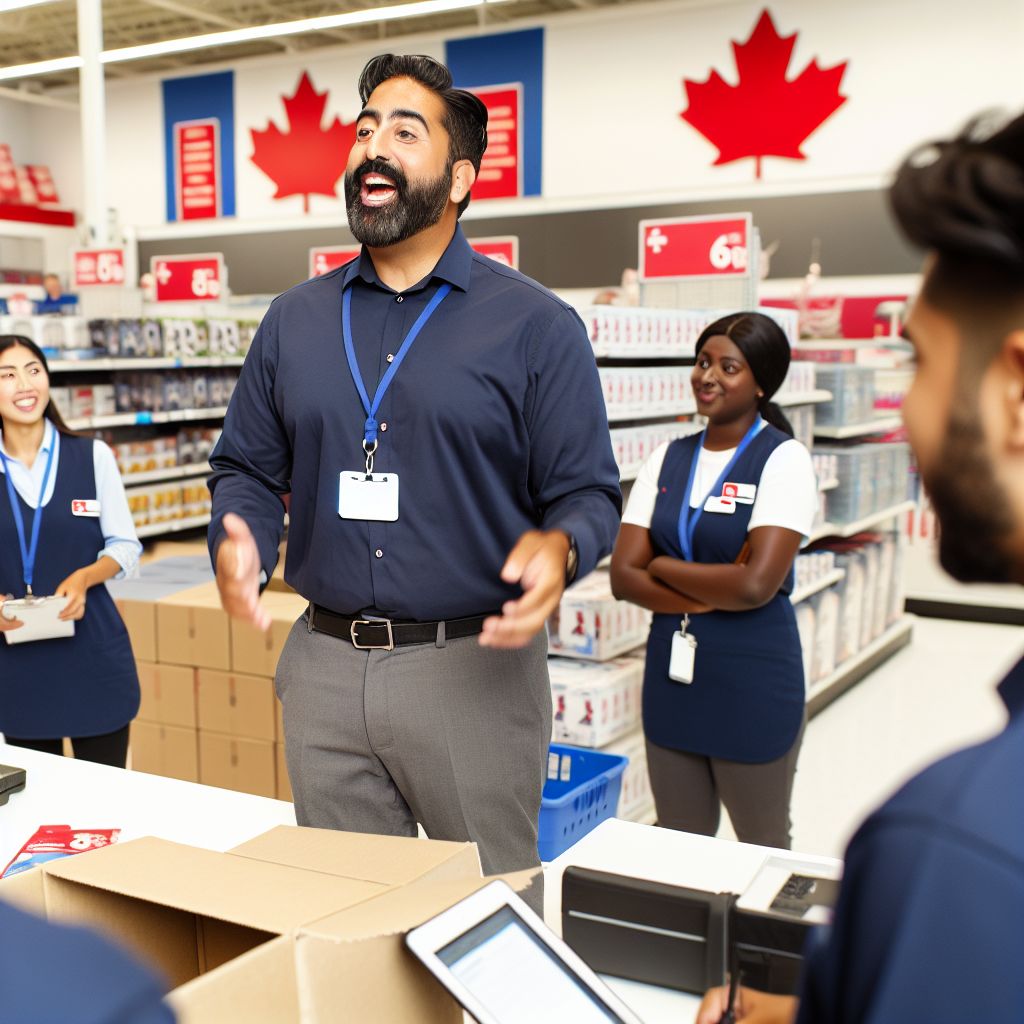Understanding Team Dynamics and Individual Motivations
The Importance of Team Dynamics
Team dynamics significantly impact a store’s performance.
They influence communication, collaboration, and overall morale.
When team members understand each other’s strengths, they work more effectively.
Additionally, positive dynamics foster a supportive environment for all.
Identifying Individual Motivations
Every team member has unique motivators that drive their performance.
Understanding these can lead to more effective management strategies.
For instance, some may thrive on recognition, while others seek personal growth.
Additionally, monetary incentives may motivate certain individuals.
Identifying these factors allows you to tailor your approach.
The Interaction of Team Dynamics and Individual Motivations
Team dynamics and individual motivations are interlinked.
A cohesive team can enhance individual motivation levels.
Conversely, a motivated individual can uplift team dynamics.
Regularly assessing both aspects is crucial for ongoing improvements.
Ultimately, a balanced approach will lead to better overall results.
Strategies for Enhancing Team Dynamics
Establishing open communication channels is essential.
Encourage team members to share ideas and feedback openly.
Moreover, organize team-building exercises to strengthen relationships.
Setting shared goals fosters a sense of unity among team members.
Recognizing achievements collectively can further enhance team spirit.
Strategies for Motivating Individuals
Regular one-on-one discussions help understand individual aspirations.
Provide opportunities for skill development tailored to their needs.
Moreover, offer flexible work arrangements if possible.
Establishing a recognition program can boost morale significantly.
Ensure that everyone feels valued and respected in their roles.
Establishing Clear Goals and Performance Expectations
Importance of Clear Goals
Clear goals provide a roadmap for your team.
Unlock Your Career Potential
Visualize a clear path to success with our tailored Career Consulting service. Personalized insights in just 1-3 days.
Get StartedThey guide employees in their daily tasks.
Moreover, specific targets increase accountability.
This clarity enhances overall team performance.
Setting SMART Goals
Utilize the SMART framework for goal setting.
Ensure goals are Specific, Measurable, Achievable, Relevant, and Time-bound.
This strategy fosters focused efforts among team members.
For instance, instead of saying “improve sales,” specify “increase sales by 15% within three months.”
Communicating Goals Effectively
Regularly communicate your expectations to the team.
Hold meetings to explain goals clearly.
Utilize visual aids to reinforce these objectives.
This regular communication creates a sense of shared purpose.
Involving the Team in Goal Setting
Encourage team involvement in the goal-setting process.
This inclusion fosters a sense of ownership.
Moreover, it enhances motivation and commitment.
Consider conducting brainstorming sessions to gather input from team members.
Monitoring Progress
Regularly track progress towards goals.
Implement performance reviews to discuss achievements and challenges.
Adjust goals as necessary based on team feedback and market conditions.
This flexibility shows your commitment to team success.
Recognizing Achievements
Acknowledge when team members meet or exceed their goals.
Use positive reinforcement to boost morale.
This recognition motivates employees to maintain high performance.
Create a rewards system that highlights significant accomplishments.
Creating a Positive and Inclusive Work Environment
Prioritizing Effective Communication
Effective communication fosters trust among team members.
Encourage open dialogue where everyone can express their thoughts.
Regularly hold team meetings to discuss issues and celebrate victories.
Utilize various communication tools to cater to different preferences.
Additionally, actively listen to your team’s feedback for improvements.
Fostering Team Collaboration
Team collaboration enhances creativity and problem-solving skills.
Organize team-building activities that strengthen relationships.
Encourage staff to work together on projects to build camaraderie.
Consider assigning mentorship roles to seasoned employees.
Moreover, celebrate collaborative efforts to reinforce teamwork.
Recognizing Individual Achievements
Recognizing individual contributions boosts morale and motivation.
Implement a system for acknowledging employee achievements regularly.
Consider an “Employee of the Month” program to highlight excellence.
Publicly celebrate achievements during team meetings or newsletters.
Additionally, tailor recognition to suit individual preferences.
Building an Inclusive Culture
An inclusive culture supports diversity and unique perspectives.
Implement policies that promote equality and respect among employees.
Encourage participation from all team members in decision-making.
Provide training on diversity and inclusion to raise awareness.
Furthermore, create a safe space for sharing personal experiences.
Supporting Professional Development
Professional development is key to employee satisfaction and retention.
Identify training opportunities that align with employee goals.
Encourage participation in workshops and seminars related to their roles.
Additionally, provide access to online courses for further learning.
Ultimately, support their career aspirations through mentorship programs.
Uncover the Details: How to Balance Work and Life as a Sales Professional
Recognizing and Rewarding Achievements and Efforts
Importance of Recognition
Recognizing achievements boosts team morale and motivation.
It makes employees feel valued and appreciated for their hard work.
Moreover, recognition fosters a positive work environment.
Different Forms of Recognition
There are various ways to recognize team efforts.
Public acknowledgment during team meetings is one effective method.
Additionally, personalized notes or emails can convey appreciation.
Gift cards or small bonuses also serve as tangible rewards.
Establishing a Reward System
A structured reward system can enhance motivation.
Set clear criteria for achievements worthy of recognition.
For example, consider recognizing top performers monthly.
Encourage peer nominations to involve everyone in the process.
Celebrating Milestones
Celebrating milestones strengthens team bonds.
Organize team celebrations for reaching sales goals.
Plan fun events such as group outings or team lunches.
Such gatherings can provide a boost in team spirit.
Feedback and Continuous Improvement
Regular feedback helps employees understand their contributions.
Encourage open communication and suggestions for improvement.
Utilize feedback sessions to discuss achievements as well.
This approach emphasizes growth and continuous progress.
Explore Further: Exploring The Difference Between Logistics And Inventory Management
Providing Opportunities for Professional Development and Growth
The Importance of Professional Development
Professional development enhances employee skills and knowledge.
It empowers team members to take on new challenges.
Moreover, it fosters a culture of continuous improvement.
Creating Development Programs
Design tailored training programs for your employees.
Consider workshops, webinars, and on-the-job training.
Additionally, partner with local colleges for advanced courses.
Encouraging Cross-Training
Facilitate cross-training among team members.
This approach broadens employees’ skills and experience.
It also improves teamwork and collaboration.
Offering Mentorship Opportunities
Create a mentorship program to engage experienced staff.
Pair them with less experienced members for guidance.
This relationship can boost confidence and career growth.
Setting Clear Growth Paths
Clearly outline potential career paths within the organization.
Regularly discuss goals and provide feedback on progress.
This transparency motivates employees to strive for advancement.
Recognizing Achievements
Acknowledge and celebrate employee achievements regularly.
Use recognition programs to reward extra effort.
This boosts morale and encourages continued professional growth.
Explore Further: Essential Skills for Successful Sales Representatives

Encouraging Open Communication and Feedback
Creating an Open Environment
Open communication is essential for team motivation.
Start by fostering an inviting atmosphere.
This should encourage employees to share their thoughts.
Implement regular team meetings for idea exchanges.
Ensure everyone feels comfortable speaking up.
Listening to Your Team
Actively listen to your team members’ feedback.
Show appreciation for their contributions.
Encourage questions to clarify misunderstandings.
Respond thoughtfully to their suggestions.
This builds trust and confidence in leadership.
Implementing Feedback Mechanisms
Establish clear channels for feedback collection.
Consider anonymous surveys for candid opinions.
Regular check-ins can also be beneficial.
Encourage employees to provide constructive feedback.
This creates a culture of continuous improvement.
Recognizing Contributions
Acknowledge team efforts publicly and privately.
Celebrate individual and team achievements.
Recognition enhances motivation and engagement.
Make your appreciation visible to reinforce positive behavior.
This fosters a sense of belonging within the team.
Find Out More: Overcoming Challenges in the Sales Representative Role
Hosting Team-Building Activities and Events
Benefits of Team-Building Activities
Team-building activities enhance communication among staff members.
They foster a collaborative environment for your store.
Additionally, they boost overall morale and engagement.
Planning Effective Activities
Begin by considering the interests of your team.
Engage employees in decision-making for activities.
This involvement increases their buy-in and enthusiasm.
Types of Activities to Consider
- Outdoor adventures promote teamwork and trust.
- Workshops focus on professional development.
- Social gatherings enhance personal relationships.
Promoting Healthy Competition
Introduce friendly competitions to spark excitement.
Consider team challenges or store performance rewards.
Incentivizing success encourages collaboration and effort.
Creating a Positive Atmosphere
Ensure a welcoming environment during all activities.
Respect individual differences and promote inclusivity.
A positive atmosphere fosters stronger team bonds.
Modeling Motivation Through Your Own Leadership Style
Establishing a Positive Work Environment
Your attitude sets the tone for the store.
A positive outlook encourages employees to perform well.
Show enthusiasm for tasks and goals.
This enthusiasm can be contagious.
Invite team members to share their ideas regularly.
Listening fosters trust and respect.
Leading by Example
Demonstrate a strong work ethic.
When you show dedication, your team will likely follow suit.
Be punctual and reliable.
Your behaviors serve as a model for employees.
Consistently maintain high standards in your roles.
Recognizing Team Efforts
Celebrate both small victories and major accomplishments.
Acknowledge individual contributions to inspire further success.
Use verbal praise to reinforce positive behaviors.
Consider simple rewards for top performances.
This recognition builds morale and motivation.
Encouraging Open Communication
Maintain an open-door policy for feedback.
Your team should feel safe discussing concerns and ideas.
Regular team meetings can facilitate this dialogue.
Encourage brainstorming sessions.
This involvement fosters a sense of ownership.
Investing in Professional Development
Provide training opportunities for your team.
Encourage employees to learn new skills relevant to their roles.
Support them in attending workshops or seminars.
This investment shows you value their growth.
Moreover, skilled employees contribute to store success.
Setting Clear Goals
Clearly defined goals enhance team motivation.
Set achievable and specific objectives.
Discuss these goals with the team regularly.
Track progress and celebrate milestones together.
This practice creates a shared purpose and direction.
Additional Resources
Andrew Fella – Director of Licensee Operations (US & Canada …
If you were a retail store manager, what steps might you take to …




